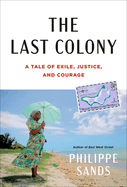
In The Last Colony, Philippe Sands combines a moving story of human tragedy and injustice with the complexities of international law to great effect.
The Chagos Archipelago is a little-known collection of islands in the Indian Ocean near Mauritius, colonized by European interests. In 1973, the British forcibly removed its longtime residents, ostensibly to make way for a United States military base on a single island. Residents for generations, in many cases descended from enslaved coconut oil workers, were deported en masse with no notice, forced to leave behind their homes, memories, pets, and any possessions that didn't fit in a single small trunk. Among them was Liseby Elysé, recently married, 20 years old, and four months pregnant. Decades later, in 2018, Madame Elysé would be present for the decision of the International Court of Justice in The Hague that would allow her to return to her home island, for which she'd yearned all those years. Her testimony would be an important part of that case.
Sands (East West Street; The Ratline) was part of the legal team representing Mauritius in its bid to free the Chagos from British control. With a lawyer's careful research and methodical laying out of the facts, Sands rewinds to 1945 and Ralph Bunche's work on decolonization at the founding of the United Nations. The Last Colony is both a neat work of detailed legal points and history, and a deeply felt narrative about the injustice of deportation and the dwindling number of Chagossians with strong ties to their homeland. There is much to appreciate about this little-known story in Sands's sensitive telling. --Julia Kastner, librarian and blogger at pagesofjulia

